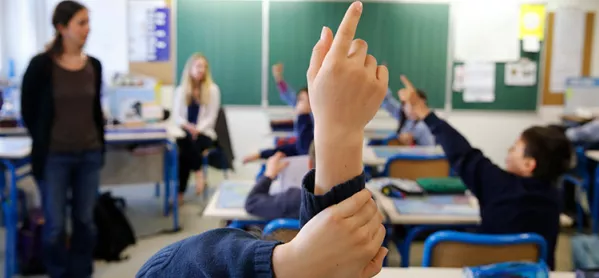- Home
- ‘Bad feedback from pupils knocks you sideways’
‘Bad feedback from pupils knocks you sideways’

What keeps me awake at night? Negative feedback from my class.
No matter how much of an experienced or wonderful teacher you are, a piece of negative feedback can come out of nowhere and knock you sideways.
I was teaching a lesson on an exhausting afternoon at the tail-end of the past academic year when a 17-year-old pupil told me that my lesson was rubbish and that they didn’t learn anything. As much as I didn’t want to admit it, it left me doubting my ability to teach.
I felt undermined in front of the class and was worried that it would open the floodgates for future criticism from pupils. I felt unappreciated, especially at a time when I was putting in countless hours planning and marking beyond the working hours to help pupils complete their courses.
With the pressure on teachers bigger than ever to conduct high-quality lessons all-year-round, being labelled negatively is not an option, in light of ongoing learning walks and lesson observations.
‘Embarrassed and humiliated’
I was utterly embarrassed and humiliated. In pausing to look at the floor, I willed it to open up and swallow me whole. Internally, I was fuming, but, of course, I calmly responded with: “Let’s speak after the lesson.” Eventually, in private, I received an apology for the outburst.
Reminiscing about the negative comments can keep any teacher awake at night.
You ponder over what made the pupil express these negative comments in the first place. Was it sheer frustration displayed as a defence mechanism at not being able to cope with a task, perhaps pitched too high? Was the pupil having doubts about their own ability to complete the work? Was it pressure from the teacher to meet a target grade? You’ve got three options:
Give up teaching. Maybe it’s no longer for you.
Adopt the broad-shoulders approach. Accept that it’s “normal” behaviour by a “challenging” child.
Or reflect, take the bull by the horns and try and do something about it.
For the sake of this blog, let’s say the third option wins. It’s hard to do, but we should always take negative feedback on board, no matter how rudely it’s delivered. We should take the time to listen to our pupils and decide on a plan of action.
The consequences of neglecting this type of reflective practice are twofold. Firstly, it can hamper the progress of your pupil, which, of course, can come back to bite you when it comes to data collection. Equally, it can have a detrimental impact on your own personal development. Taking these consequences into account, we run the risk of falling to a standard where low expectations fester.
Reflect on your teaching
To accelerate inspirational teaching, we must refine our practice by factoring in reflective practice to enhance our craft. The power of applying reflection, particularly after stressful incidents, can ensure that any inadvertent habits are curtailed. Avoiding any repeats of negative comments can be challenging but it must be the ongoing teaching target to show the ability to recover from pupils’ criticism and maintain the stability of our mental health.
I’ve developed my own reflective system for doing so:
- Reflect on the lesson occurrence;
- Reflect on achievement in the lesson;
- Reflect on targets for future teaching;
- Enforce these targets by a specific date.
Recording reflections in this manner enabled me to contextualise my finding. I planned real-life changes to implement, retrospectively. Here’s how it worked in practice:
Lesson occurrence: I reflected on the pupils’ comments that were made. How would I deal with the pupil in the following lesson? Would there be further comments of reprisal from the pupil?
Achievement: I was convinced that the majority of pupils had made good progress against the lesson objectives.
Targets: I delegated a leadership role to a more vocally confident pupil in the group. Indirectly, this provided a developmental outlet, minimising low-level disruption. Vital employment skills, such as communication and cooperation, were utilised, to mention a few.
Enforce: I was able to enforce the targets mentioned in the following lesson, to minimise a repeat of the pupils’ outburst in future lessons. Teaching, learning and assessment: these form the crux of productive teaching environments.
Recollecting the pupils’ outburst kept me awake that night. Neglecting to deal with disruptive pupils’ outbursts in quick time-frames can be catastrophic for whole-class progress and behaviour management.
I now sleep more comfortably, knowing that I have positive solutions to unleash. Pupils prefer teachers who show resilience, bouncing back from lesson “fails”, using this as the impetus to build upon existing positive outcomes with renewed vigour.
Fabian Darku is a lecturer in Hertfordshire
Keep reading for just £1 per month
You've reached your limit of free articles this month. Subscribe for £1 per month for three months and get:
- Unlimited access to all Tes magazine content
- Exclusive subscriber-only stories
- Award-winning email newsletters